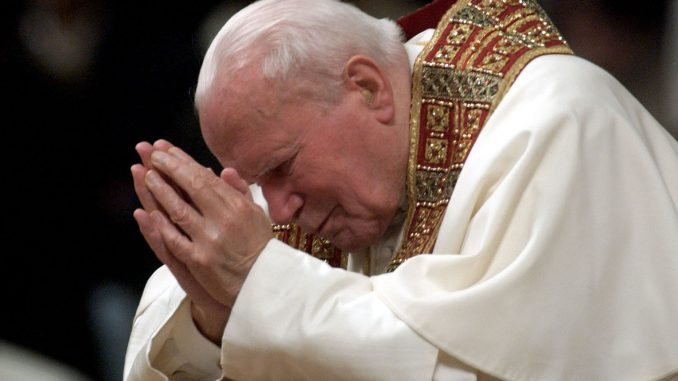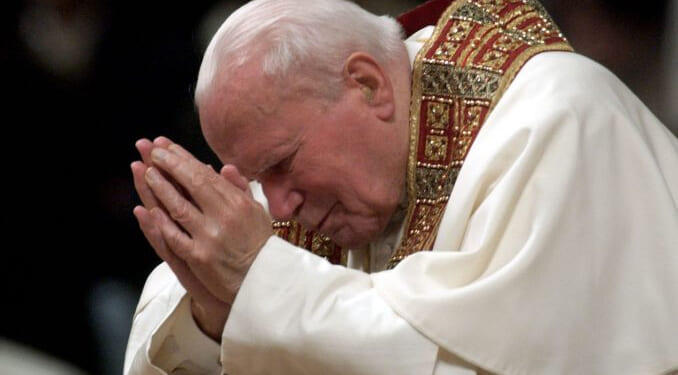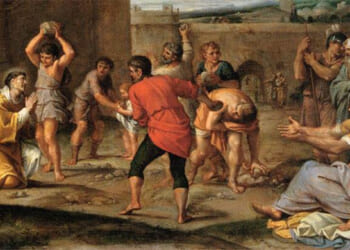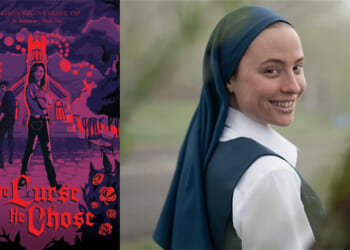
In his statement commenting on Senator Richard Durbin’s decision to decline a Lifetime Achievement Award from the Archdiocese of Chicago, Cardinal Blase Cupich admonished U.S. Catholics to reflect on a homily that Pope John Paul II gave in the Archdiocese of Newark in 1995:
Thirty years ago, St. John Paul II preached a homily in our nation in which he vigorously defended the rights of the unborn, the elderly, and disabled people, and cited the poem inscribed on the base of the Statue of Liberty. He asked, “Is present-day America becoming less sensitive, less caring towards the poor, the weak, the stranger, the needy? It must not! Today, as before, the United States is called to be a hospitable society, a welcoming culture. If America were to turn in on itself, would this not be the beginning of the end of what constitutes the very essence of the ‘American experience’?” We need to listen to these prophetic words in this moment of our nation’s life.
Indeed, we do need to listen to those words–as we ought to do at every moment in our national life.
We should also listen to John Paul II’s words in the very next paragraph of that homily, which the cardinal did not cite:
To a great extent, the story of America has been the story of long and difficult struggles to overcome the prejudices which excluded certain categories of people from a full share in the country’s life: first, the struggle against religious intolerance, then the struggle against racial discrimination and in favor of civil rights for everyone. Sadly, today a new class of people is being excluded. When the unborn child – the “stranger in the womb” – is declared to be beyond the protection of society, not only are America’s deepest traditions radically undermined and endangered, but a moral blight is brought upon society. I am also thinking of threats to the elderly, the severely handicapped and all those who do not seem to have any social usefulness. When innocent human beings are declared inconvenient or burdensome, and thus unworthy of legal and social protection, grievous damage is done to the moral foundations of the democratic community. The right to life is the first of all rights. It is the foundation of democratic liberties and the keystone of the edifice of civil society. Both as Americans and as followers of Christ, American Catholics must be committed to the defense of life in all its stages and in every condition.
In other words, the inalienable right to life from conception until natural death is not one concern amid a broad menu of Catholic concerns about public policy. It is, to repeat, “the first of all rights,” “the foundation of democratic liberties,” and “the keystone of the edifice of civil society.” To fail to grasp this–as Senator Durbin has done ever since he abandoned his early pro-life position for what can only be understood as reasons of political convenience–is to do “grievous damage” to “the moral foundations of the democratic community.”
Moreover, years after John Paul II issued that warning in Newark, Senator Durbin went far beyond casting the pro-“choice” votes that got him a NARAL Pro-Choice America’s 100% rating. He did everything in his power to see to the defeat of Illinois Representative Dan Lipinski, one of the few remaining pro-life Democrats in the U.S. House of Representatives.
Which is to say, Durbin not only cast morally dubious votes against the “first of all rights” for decades; he contributed to the brutal purge that has now made it virtually impossible for a pro-life Democrat willing to shore up “the keystone to the edifice of civil society” to function in national politics.
Cardinal Cupich reiterated the Archdiocese of Chicago’s commitment to the pro-life cause, stating that the “right to life needs to be defended without compromise.” That commitment is entirely welcome. But if it is linked, as the cardinal seemed to do, to the suggestion that the set-in-concrete Democratic orthodoxy demanding “choice” at any moment in a pregnancy is the result of a lack of dialogue, that is not-quite-right.
And a prime example is Senator Durbin.
As I noted in my recent article in this space, Cardinal Cupich’s distinguished predecessor, Cardinal Francis E. George, OMI, tried to persuade Senator Durbin of the manifest justice of the pro-life cause and the imperative of supporting it in legislation. In his time, Cardinal George was, arguably, the most intellectually accomplished bishop in the history of the American hierarchy. He was also a sensitive pastor and a man of calm demeanor.
If that combination of irrefutable arguments and a heartfelt appeal to decency could not convince Dick Durbin to become a pro-life leader–or, at the very least, to cease being in thrall to the most radical pro-“choice” forces in American public life–it was not for want of a lack of political sophistication, dialogue, or compassion on Cardinal George’s part.
Cardinal Cupich is surely right that shutting down discussion is not the way out of our present impasses, on the life issues and other matters. But it ought to be obvious that it takes two to dialogue. And at the moment, it is not easy to see how a more mature, rational conversation on the life issues can be engaged when, in the matter of abortion at least, there are no dialogue partners to be found in the party that once prided itself on being the champion of human rights.
Perhaps, as his retirement looms ever closer on the horizon, the archbishop of Chicago could dedicate his remaining years to addressing that grave problem, one convert at a time.
If you value the news and views Catholic World Report provides, please consider donating to support our efforts. Your contribution will help us continue to make CWR available to all readers worldwide for free, without a subscription. Thank you for your generosity!
Click here for more information on donating to CWR. Click here to sign up for our newsletter.










